The Pennsylvania Pastors Network is informing Pennsylvania voters about a question on the Nov. 7 ballot regarding a Constitutional Amendment on residential property taxes. Specifically, PPN is educating residents that this issue in indeed both biblical and constitutional.
PPN is a state chapter of the American Pastors Network (APN, www.americanpastorsnetwork.net), led by its president, Sam Rohrer, who spent 18 years as a Pennsylvania legislator and was well-known for his property tax elimination plan. The question on the ballot next week is similar to the information Rohrer shared as he travelled across the state, invested thousands of hours and debated long and hard on the House Floor.
During the many years he committed to this issue, Rohrer often reminded residents about the history of taxation, that it was not needed at Creation or for a long time thereafter. As the government was formed, a small government imposed small taxes.
“Taxes in and of themselves are not wrong,” Rohrer said. “Historically, taxes as a general rule tended to be imposed on foreigners or conquered peoples in the form of forced tribute. They were usually not imposed on citizens. Throughout the time of the Roman Empire to our founding, countries with a government continued to impose a range of taxes. Most all were burdensome, the result being generally two classes of people—the wealthy and the poor—until a middle class developed.”
Rohrer added that throughout history, a clear and focused emphasis was on the right to own and keep private property. Then, the concept of private property was equal to liberty itself.
“I believe, too, that liberty and private property are joined at the hip,” he said. “You cannot have one without the other. “The Founders knew history well and referenced it repeatedly. For example, they knew that the burdens imposed by heavy taxation were the cause of revolutions, distress, misery and slavery. They knew that oppressive taxes were like a moth or rust that eats and decays. They knew the biblical and historical foundation for private ownership of property. As an illustration, when the Israelites left Egypt after 400 years in bondage and went to the Promised Land, God gave them the land for an inheritance. Here, God established the sacred principle of possessions, private property and the concept of inheritance. Every person was given an appropriate inheritance to be theirs forever. The intent was to create the basis for wealth and to allow it to be passed on to succeeding generations.”
How does this translate to today’s debate on property taxes in Pennsylvania?
Many seniors in Pennsylvania communities have lost or are continuing to lose their homes because of property taxes. Therefore, PPN is urging voters to research the property tax issue before Nov. 7. One method is to view the 2017 Judicial Guide for November 7th Election from the Pennsylvania Family Council and scroll down to the “Ballot Question” concerningAmending the Homestead Property Tax Assessment Exclusion.
“The Founders knew and understood the principle of private property and its sacred foundation,” Rohrer said. “Many passages in the Bible (I Kings 4:25, Isaiah 36:16, Micah 4:4) say that safety and liberty and private property are joined. And what did our Founders say in the Declaration of Independence about private property? ‘We hold these truths to be self-evident, that all men are created equal, that they are endowed by their Creator with certain unalienable rights, that among these are life, liberty and the pursuit of happiness,’ and to secure these rights, governments are instituted among men.”
To cement this right into the law of the land, Article IV of the U.S. Constitution guarantees the “the right of the people to be secure in their persons, houses, papers, and effects against unreasonable searches or seizures.” The Pennsylvania Constitution, Rohrer noted, says the same thing.
“Here in America, we have been blessed more than any other nation in the world because of this approach to government and God-given rights,” Rohrer said. “When any other nation moves in aggression against its people through crushing taxation, the theft of property always follows. So whether it is Russia, China or France—communism, socialism or fascism—private property is either owned outright by government or is controlled by government.
“That brings us to today, where we are beneficiaries of men who knew and recognized God’s pattern for individual, families and governments and who understood that governments are to identify and protect God-given rights—not to violate them,” he continued. “Government is to be limited in scope and therefore not require much tax. Social needs are to be met through extended families and churches. Only when people reject God and throw off dependency on Him and demand ever-increasing service from government do taxes become increasingly oppressive and the size of government become explosive.
“Today, we stand as a nation with oppressive taxes,” Rohrer concluded. “Just exactly which tax is the most oppressive varies. In Pennsylvania, it is the school property tax. Why? Its sheer magnitude, its linkage to private property, its ability to devour one’s home and throw out in the street those unable to pay, its ability to make a free person into a slave, its ability to destroy initiative, and its ability to remove ‘independence’ from the citizen and transform that independence into ‘dependence.’”

Amen, Sam! I will be voting YES on the Constitutional Amendment on residential property taxes!
Amen! Thank you for this.. I feel I voted correctly now. 🙂